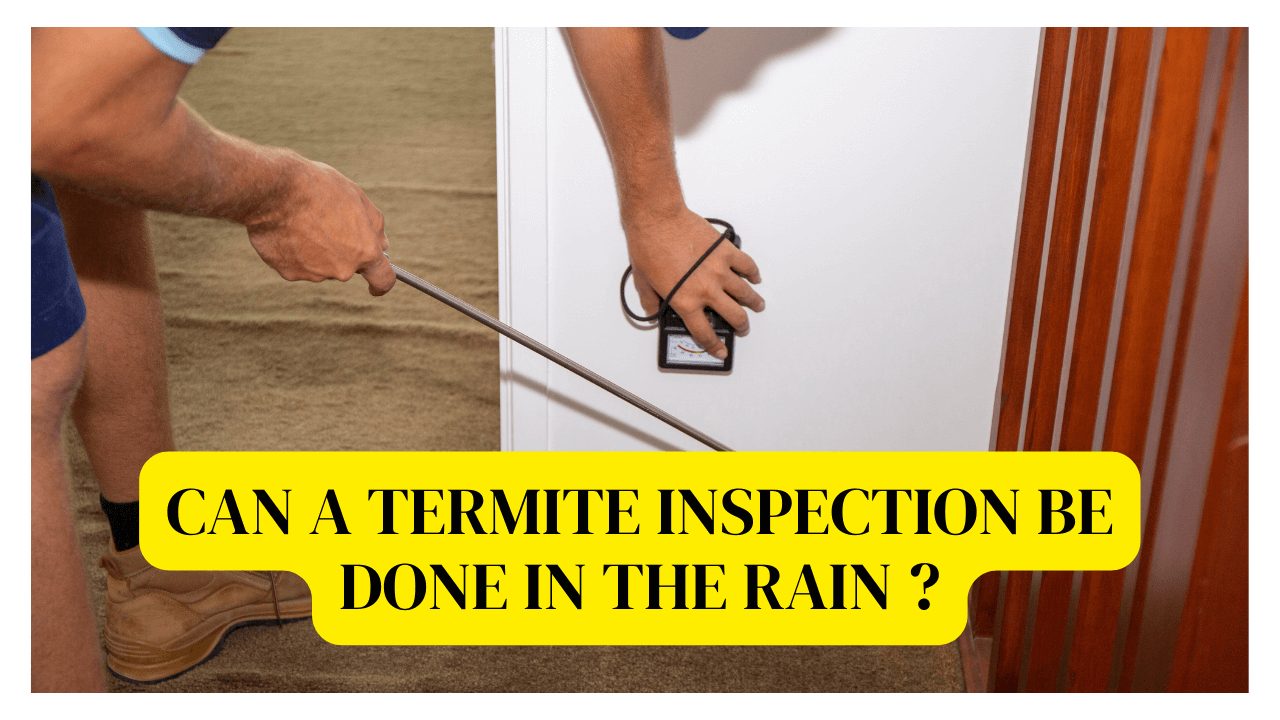You might be concerned about rain if you’re ready to have your house inspected. It rains practically every day, especially during the summer months, and you don’t want this to prevent you from closing on your new house. The good news is that most inspectors are offering termite inspection services even in the rainy season.
However, you have to know about the effectiveness of these services, primarily in the rainy season.
Although termites appear indestructible when they infest dwellings, they are essentially delicate creatures that require certain levels of moisture, protection, and heat to survive. It’s not surprising that rain impacts termite activity because rain is one of the critical controllers of soil moisture and temperature in nature.
Rainstorms cause flying termites to mate during hot weather and cause water damage in dwellings, which attracts termites and other pests. Rain might also make it more challenging to get rid of tenacious termite infestations.
Table of Contents
Is Rain And Termite Services Interlinked?
If we see it generally, rain doesn’t affect the termite services patterns. However, the chances of the affected area may hire especially in this season because of humidity and moisture everywhere. Consider your home to see why the weather does not affect pest control services.
Professionals typically stay exceptionally near to the home’s perimeter while applying pesticides to the outside surfaces of your home.
Because eaves and overhangs often protect these locations, they can apply materials and have them operate even when it’s raining. In many cases, the rain brings bugs out of their hiding places. They are significantly more susceptible to chemicals. At that point, experts employ to treat them while they are out and about.
Rain Increases The Termite Growth Chances
Homeowners may notice swarms of winged termites known as alates after rainstorms and showers because termites require moist soil to survive; newly dampened earth signals alates to begin the mating process.
After mating, the male and female alates drop their wings and burrow underground to create their nests. Swarming seasons vary by locale, but flying termites usually appear in the early spring.
As a result, pesticide applications can be far more effective in the rain, even if they appear to be less effective at first due to pests coming out to get water. This holds not only for applications around the perimeter of your property but also for applications in your yard.
What Are The Main Causes Of Increased Termites After Rain?
After the rain, damp soil and standing water in yards can attract many termites to a property. Damp wood and subterranean termites, two of the most prevalent kinds of termites, tend to infest moist or decaying wood. They are most commonly seen in wood that has become moist due to contact with the soil, flooding, or leaking pipes.
Examine parts of the house where widespread water damage, such as crawl spaces, sill plates, soffits and fascia behind leaking gutters and porches for termites.
Rain Affects The Termite Services Sometimes
After severe rains, several termiticides and chemical products may be less effective. Heavy rainfall and flooding, for example, can dilute liquid soil treatments for subterranean termites to the point of ineffectiveness. Pest control experts know when and where to apply treatments.
As a result, engage professionals to address termite problems in any weather for the most satisfactory outcomes.
Knowing how lawn treatments operate might help you comprehend why rain is more beneficial than a disadvantage in lawn maintenance. Pesticides applied on the ground are frequently in granular form, which requires water to activate.
When it rains, the water helps bring these granules down into the soil, where they can attack the insects that lie in and beneath your lawn. This can help pesticides control insects in your yard more rapidly.
It’s Easy To See The Termites After Rain
Termites are visible to the naked eye, despite their small size. Swarmer, or winged termites, are more significant than workers and can be seen more quickly. This is advantageous because swarmer, which takes to the air during mating season in search of new nesting locations, are most likely to be encountered by homeowners.
Rain does not only have any effect on the effectiveness of a pest control treatment, but it can also be helpful and necessary for activating some treatments! The majority of the time, pest control is applied near the foundation and around door or window frames on the home’s exterior.
How To Treat The Area After Getting The Termite Services?
After the company has completed their work, request that they engage a professional cleaning company to clean your home. Moreover, keep your windows open to properly aerate your home. If you didn’t remove them before the fumigation, shampoo the carpets and wash bedding, curtains and any other things.
To procreate, established colonies produce flying male and female termites, which form swarms. Fertilized termites shed their wings after mating flights and go on to start new colonies. The presence of flying termites in a home indicates the presence of a mature colony.
Final Thoughts
If you haven’t noticed, there is no clear-cut answer for pest management and rain. If there is more than a chance of light rain while professionals are doing your service, they will reschedule.
It’s critical to contact the experts as soon as you encounter a problem during the rainy season. You should never postpone or put off getting rid of bugs in your house or yard if you notice evidence of them.
Pests will stay and multiply if they find your home to be a secure sanctuary. Delaying pest control treatment may cause infestations to last longer than anticipated.
Not only does this make it more challenging to eliminate the problem, but some pests, such as termites, are also more dangerous. Rainy weather also encourages termites to mate when the temperature is warm.





